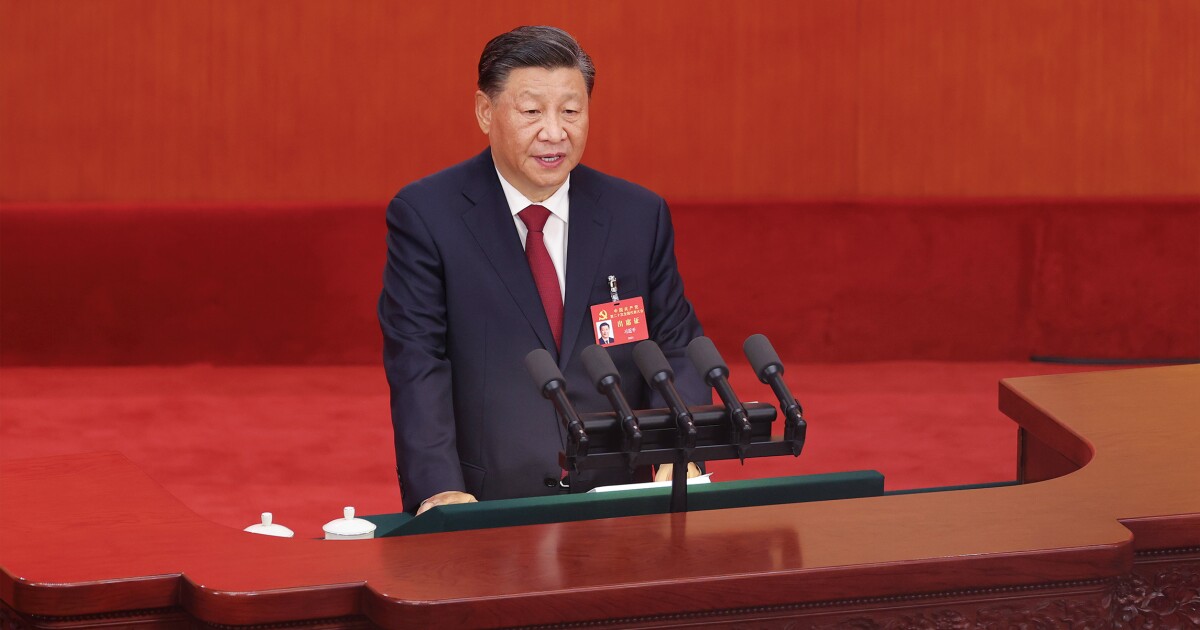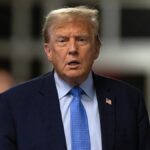

It has been described as “a coronation.”
At a weeklong Chinese Communist Party national congress this month, Xi Jinping, 69, secured an unprecedented third five-year term while consolidating enough power so that he can likely secure a fourth or even fifth term, if he wants it.
Speaking on the opening day of the party congress, the putative leader-for-life laid down a marker that was met with thunderous applause by the 2,000 delegates packed into Beijing’s cavernous Great Hall of the People.
BIDEN ADMINISTRATION MUST INVESTIGATE THREAT OF CHINESE OWNERSHIP OF US FARMLAND, GOP SAYS
“Taiwan is China’s Taiwan,” the Chinese leader said. “We will continue to strive for peaceful reunification with the greatest sincerity and the utmost effort, but we will never promise to renounce the use of force.”
“The wheels of history are rolling on toward China’s reunification,” he continued. “Complete reunification of our country must be realized, and it can, without doubt, be realized!”
China has the world’s second-largest defense budget after the United States, and Xi harbors ambitious plans to build his country’s People’s Liberation Army into a “world-class military” by 2049.
China hasn’t fought a land war in more than four decades, not since it invaded Vietnam in 1979, but Xi is vowing to turn the PLA into a modern fighting force capable of deterring “crises and conflicts” and winning “local wars.”
“We will intensify military training under combat conditions, laying emphasis on joint training, force-on-force training, and high-tech training,” he said.
While not mentioning Ukraine, Xi seemed to confirm that China is learning a lot about how a war against a smaller enemy backed by the U.S. is fought.
“We will study and gain a good grasp of the characteristics of informatized and intelligent warfare and the laws that govern it, provide new military strategic guidance, and develop strategies and tactics for a people’s war,” Xi said. He promised “new-domain forces with new combat capabilities” while speeding up the development of “unmanned, intelligent combat capabilities.”
“China would prefer coerced unification that avoids armed conflict, and it has been stepping up diplomatic, economic, and military pressure on the island for years,” Avril Haines, the director of national intelligence, told the Senate Armed Services Committee in May. She added, “Beijing is prepared to use military force if it decides this is necessary.”
“It’s our view that they are working hard to effectively put themselves into a position in which their military is capable of taking Taiwan over our intervention,” Haines testified.
As recently as last month, the Pentagon said it had detected no shift in Beijing’s timeline, and in fact, suggested that Xi may be chastened by Russia’s embarrassing failures in Ukraine — a war effort that Russian President Vladimir Putin expected to be a cakewalk.
“It’s no mystery that Xi Jinping has given his military until 2027 to develop the military capabilities to forcefully reunify with Taiwan, but I’ve seen no indication that he’s made that decision to do so,” said Colin Kahl, the Pentagon’s undersecretary of defense for policy, at a defense forum.
“I would hope that they would draw the lesson from Russia’s experience that ‘Hey, maybe … we shouldn’t do that,'” Kahl said.
But two days after Xi’s speech, Secretary of State Antony Blinken seemed to suggest that Xi is getting increasingly impatient, has made a “fundamental decision” that the status quo of Taiwan as a self-governing island is “no longer acceptable,” and is “determined to pursue reunification on a much faster timeline.”
At a Hoover Institution event at Stanford University, Blinken said China is “profoundly disrupting the status quo and creating tremendous tensions” as Xi escalates threats to bring Taiwan under Beijing’s control.
“If peaceful means didn’t work, then it would employ coercive means, and possibly, if coercive means don’t work, maybe forceful means, to achieve its objectives,” the secretary of state said.
The ramp-up in rhetoric follows President Joe Biden’s repeated assertions, most recently in a CBS 60 Minutes interview, that the U.S. would come to the defense of Taiwan if China invades. That’s a muddying of America’s long-standing policy of “strategic ambiguity” designed to keep Beijing guessing about the level of military support America would provide.
Biden told CBS’s Scott Pelley that the U.S. military would defend Taiwan if “there was an unprecedented attack.”
“So unlike Ukraine, to be clear, sir, U.S. forces, U.S. men and women, would defend Taiwan in the event of a Chinese invasion?” Pelley pressed, to which Biden replied, “Yes.”
Biden’s National Security Strategy names China as America’s “only competitor with both the intent to reshape the international order and, increasingly, the economic, diplomatic, military, and technological power to do it.” But the just-released document drew sharp criticism from Republicans for listing climate change as “the greatest and potentially existential” threat facing the world.
“The Chinese Communist Party is again making clear that it is the single greatest threat to our national interests,” said Rep. Mike Gallagher (R-WI), a member of the House Intelligence and Armed Services committees.
“We desperately need a sense of urgency to put hard power in Xi’s path before it is too late,” the Republican said in a statement in response to the Chinese leader’s address. “This starts with providing Taiwan with security assistance and moving them to the front of the [Foreign Military Assistance] line, maxing out munitions production, and augmenting and dispersing American hard power forward in the region.”
Gallagher also presided over the release of the Heritage Foundation’s latest Index of U.S. Military Strength, which rates the readiness of the U.S. Army as “marginal,” the Navy and Space Force as “weak,” and the Air Force as “very weak.” Those are the lowest grades in the nine-year history of the highly respected index.
Only the Marine Corps and U.S. nuclear forces were rated “strong.”
Meanwhile, the chapter on China judges its military as “aggressive” for its level of provocation and “formidable” for its level of capability.
“The American military forces are in a diminished state, as readiness issues, old equipment, and a lack of capacity calls into question its ability to defend the United States and its interests,” the just-released report concludes.
“When it comes to Taiwan, time is not on our side. We have entered the window of maximum danger,” said Gallagher in a speech at Heritage, referring to one U.S. commander’s assessment that China may make a move on Taiwan within the next five years.
“Most of the transformative technology DoD is investing in with its much-hyped 9.5% increase in research and development dollars, from hypersonic weapons to ‘Joint All Domain Command and Control,’ may not be fielded until the 2030s — if at all,” Gallagher said. “Making matters worse, we’re running low on the munitions that are essential to both Ukraine and Taiwan. Two months into the war, we had already sent Ukraine a quarter of our entire Stinger stockpile and more than seven years’ worth of Javelins.”
CLICK HERE TO READ MORE FROM THE WASHINGTON EXAMINER
One early lesson from the war in Ukraine, Gallagher argues, is that despite clear U.S. threats of harsh sanctions and the promise of military assistance to Kyiv, after the fact, Pentagon leaders were forced to concede Putin was simply “not deterrable” due to the ardor of his irredentist ambitions.
“This was an important, if inadvertent, admission about the supremacy of hard power, one that has profound implications for how we deter a war with China over Taiwan,” Gallagher said.






